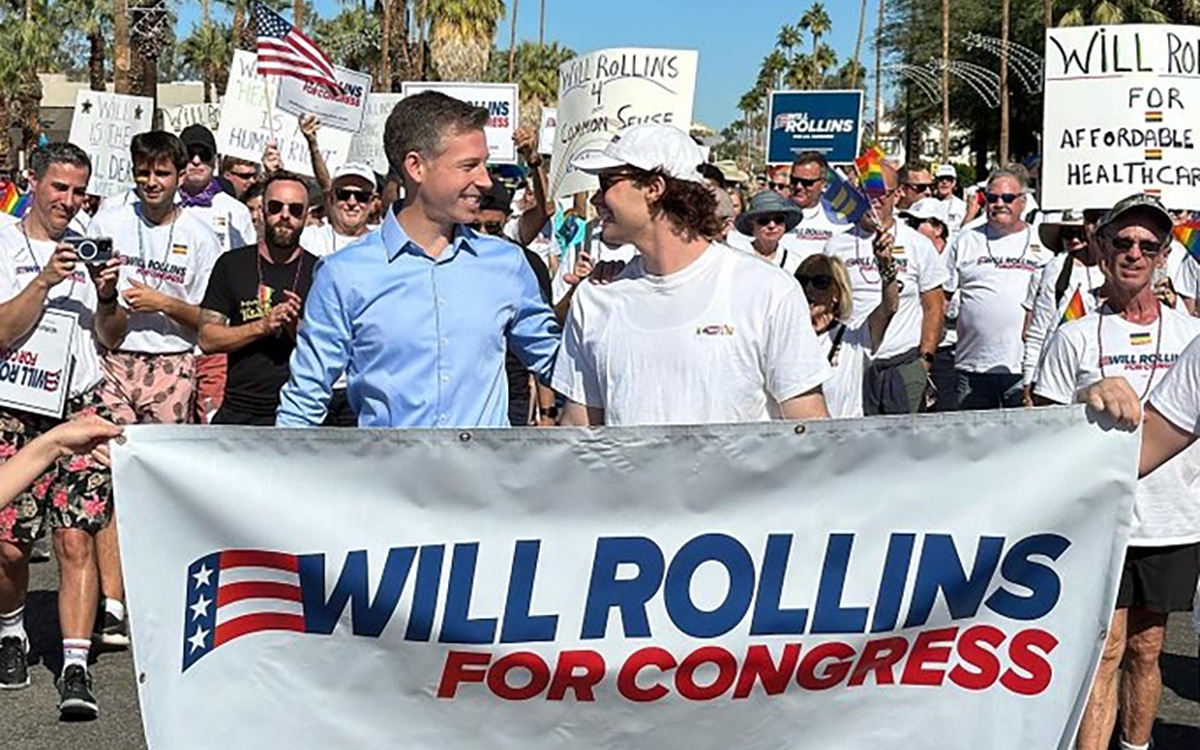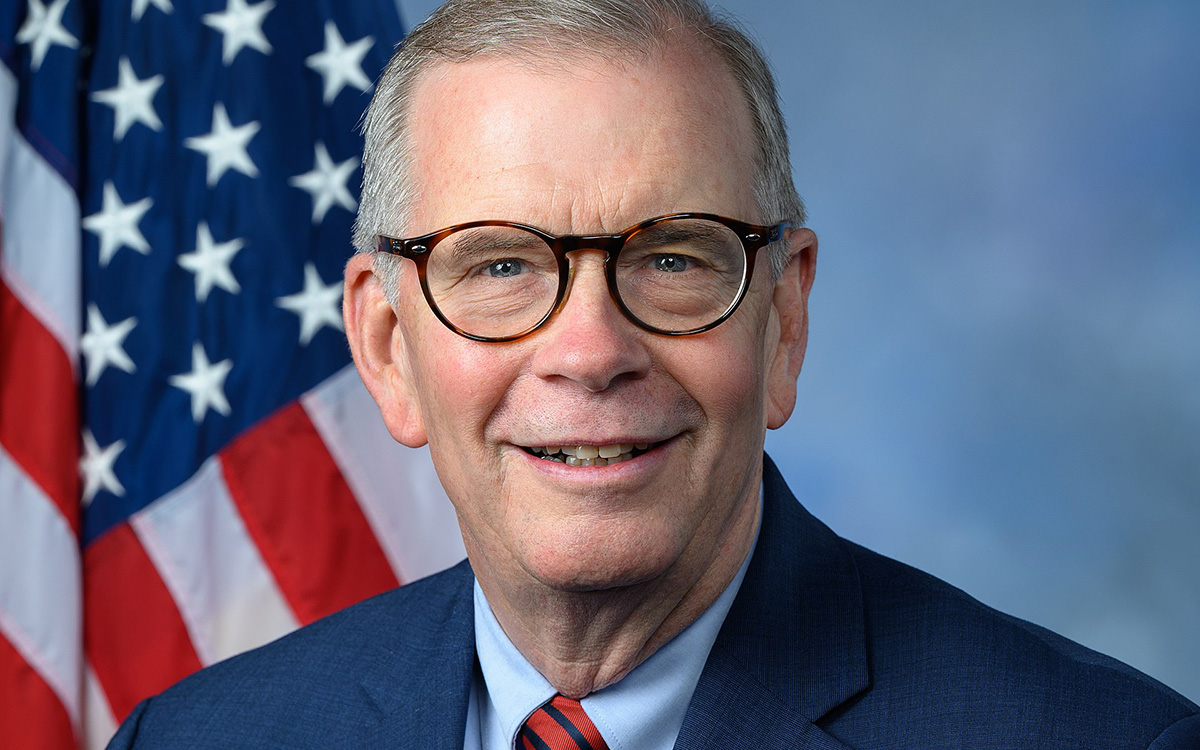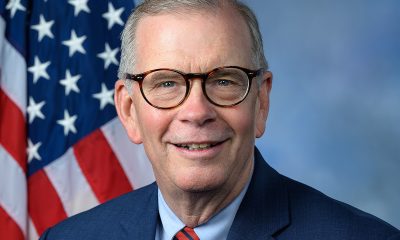Politics
Will Rollins campaign not just about gunning for anti-LGBTQ Congressman Ken Calvert
Gay prosecutor running in Calif. 41st Congressional District

Two years ago, openly gay prosecutor Will Rollins launched his first bid for public office and nearly defeated incumbent Republican U.S. Rep. Ken Calvert, who has represented California in Congress since the presidential administration of George H.W. Bush.
In this election cycle, the Democratic challenger believes he is even better positioned to win the seat for the state’s 41st Congressional District, which could tip control of the U.S. House of Representatives to his party now that Republicans have only a feeble five-member majority in the chamber.
And if accurate proxies can be found in the results of recent polls, quarterly fundraising metrics, and extra muscle deployed by the Democratic Congressional Campaign Committee, it appears Rollins’s confidence is shared by critical masses of voters, donors, and party leaders.
Speaking with the Washington Blade by phone on June 13, Rollins explained why his candidacy is resonating so strongly with constituents from across the political spectrum, including key swaths of Republicans and the 90,000 Independents “who are going to decide this election.”
On the one hand, Rollins said he is buoyed by flagging support for his opponent. He argued that instead of working to deliver results for his constituents like “high paying jobs, better wages, and better benefits for workers,” Calvert has instead spent much of his time in Congress helping to fuel costly culture wars and embracing right-wing extremism while enriching himself through “legalized corruption” schemes and undermining the justice system and rule of law.
At the same time, Rollins said that his background in law enforcement, his political orientation as a moderate, and his policy agenda, which includes a focus on popular and often populist reforms, has proven to be a winning formula on the campaign trail from the westernmost parts of Southern California’s Inland Empire to the Colorado Desert town of Palm Springs.
The city, home to a thriving LGBTQ community, helped make the 41st District far purpler after congressional maps were redrawn to include the region in 2022. Rollins said the redistricting helps to explain “part of why people are so bullish on flipping the seat.”
He explained, “Calvert has historically [represented] deep red parts of southern California, and that used to include Murrieta and northern Temecula,” Rollins said. When the new maps were drawn, “he lost those two cities and he gained the Coachella Valley, Palm Springs, Rancho Mirage, Palm Desert, La Quinta, Indian Wells, all of which had previously been represented by a Democrat, Raul Ruiz.”
Rollins is well positioned at this point in the race
Reflecting on his performance in the midterm elections, Rollins noted that 2022 saw higher turnout among Republican voters and lower turnout among Democratic voters, a hurdle made more difficult by the advantages Calvert exercised by virtue of his 32-year incumbency.
By contrast, as a first-time candidate, “when you go from a job as a federal prosecutor, where it’s the antithesis of self-promotion, to suddenly needing to build an entire brand and raise your name I.D. and self promote and campaign, that’s a steep learning curve, and I had basically six months after a primary to do it,” Rollins said.
As November approaches, the presidential race is expected to even out the disparities in voter turnout, and by now Rollins has now spent nearly three years introducing his candidacy and his campaign to residents across CA-41.
For the first time in either cycle, Rollins was ahead of his opponent (by one point) in an internal poll last month that provided respondents with no additional information about the candidates, a sign that “more people are getting to know me, and our name I.D. is increasing, and more people are also hearing our message,” he said.
The Democratic hopeful also noted his campaign out-raised Calvert’s in the third consecutive quarter, Q1 2024, and by more than $1 million, thanks to “voters and our grassroots supporters [who] know that this seat is primed to flip.”
The DCCC seems to agree with their assessment. As one of the organization’s “Red to Blue” candidates, a highly competitive distinction awarded to those with the best odds of unseating Republicans in their districts, Rollins receives “strategic guidance, staff resources, training, and fundraising support” to ensure the best possible odds for his victory in November.
Additional help from the organization responsible for fundraising and organizing on behalf of Democratic House candidates could be decisive in a race as close as this one, but Rollins also stressed his appeal among center and center-right constituents.
Building coalitions in a purple district
For example, the campaign recently secured high-profile endorsements from the likes of Stan Sniff, retired Republican sheriff of Riverside County, and California State Assemblymember Chad Mays, who previously served as the elected Republican leader.
Additionally, last month, the Palm Springs Police Officers Association, which had supported Calvert in 2022, announced it would back Rollins this year. Asked how he managed to win over the organization, Rollins pointed to his ability to relate to law enforcement officers along with his tenacious approach to engaging with the group.
“For cops in Riverside County, having somebody represent them who has worked alongside them, prosecuting MS-13, the Sinaloa Cartel, murderers, rapists, terrorists, that’s really powerful for the line officers who want somebody that understands what it is like every single day to do an important job that they do, putting their lives on the line to keep us safe,” he said.
Rollins added that he was now cowed by the group’s endorsement of his opponent during the midterms and was persistent in reaching out to facilitate a dialogue. “I refuse to give up on trying to persuade people that I would do a better job of representing them in Congress than Ken Calvert,” as well as his ability to relate to law enforcement officers.
The campaign’s efforts to engage with the Log Cabin Republicans, the conservative LGBTQ group, were less successful. Rollins said that during both election cycles “we reached out to [chapters located in CA-41] repeatedly, and all of our outreach was ignored.”
It is easy to imagine areas in which the organization could find common ground with the Democratic candidate. Rollins would be the first LGBTQ member of Congress with a law enforcement background, a candidate who has worked for a Republican governor and deliberately engaged with and courted support from other individuals and groups that are right-of-center.
He also questioned why conservative LGBT Californians would ally themselves with his opponent. “What is Ken Calvert done for you? He’s voted against the Matthew Shepard Hate Crimes Act. He’s voted against letting you serve in the military. It makes no sense to go out and support somebody like that.”
Rollins said it seems Log Cabin “is increasingly used by elected Republicans to try to maintain the appearance of support and to conceal some of their actual record on our rights” and their refusal to engage with him is likely a sign of the extent to which the GOP has become mired in partisanship.
Drawing the contrast
Rollins attributes much of his success in winning major endorsements and contributions to the many contrasts voters are seeing between his campaign and his opponent’s, perhaps starting with the professional backgrounds and records on which they are running.
In recent months, Calvert’s campaign has sought to portray Rollins as “soft on crime” because of his opposition to a criminal justice initiative, California’s Proposition 47, but the former prosecutor told the Blade he welcomes the chance to frame their race around these issues.
Rollins pointed out that while his career was spent “going after drug cartels, terrorists and violent criminals across southern California,” Calvert “is somebody who has voted to defund the FBI, who voted to defund Border Patrol, who said that the FBI has been infiltrated, [that] the Department of Justice has become a political weaponization tool,” and “called for dropping charges against people who assaulted the U.S. Capitol” on Jan. 6.
Further undermining Calvert’s effort to position himself as the “law and order” candidate is the encounter he had with police who found him consorting with a sex worker shortly into his first term in Congress, Rollins said.
He added the incident also shows the hypocrisy of his opponent’s legislative record, considering the Republican’s habit of “voting to get the government into our bedrooms and into our exam rooms, and to prevent gay people from getting married, from serving in the military.”
Rollins, who has prosecuted cases involving white collar crime, also accused his rival of exploiting “a system of legalized corruption” in Congress through which members from both parties have been allowed to exploit the powers and privileges of their office for personal financial gain with loopholes and loose oversight protecting them from consequences.
Specifically, he said Calvert has enriched himself to the tune of $20 million over his 17 terms in office “by using earmarks to benefit his own personal real estate investments,” Rollins said, “a form of insider trading in real estate.”
Rollins said that his opponent has earned a reputation for self-dealing and topped lists of the most corrupt members of Congress, with California’s 41st District taking notice. “When people have seen their own rent and gas and groceries skyrocket while their member of Congress makes $20 million since 1992, that is a major red flag for voters,” he said.
A popular policy platform
The corruption problem is bigger than Calvert, which is why Rollins said he has made reforms and policy solutions in this area a cornerstone of his campaign.
If elected, the Democrat said he will push for “a ban on members trading stock across the board” as well as “a ban on [members] using inside information to benefit their real estate investments” and “a ban on lobbying by former members of Congress.”
Rollins said he will also work to implement term limits for members of Congress and to fix the problems created by the U.S. Supreme Court’s Ruling in Citizens United v. FEC (2010), which allowed for unlimited spending by corporations and outside groups on political campaigns.
He said that even more modest reforms like establishing “disclosure rules for members” would go a long way toward mitigating concerns about the flow of dark money “into these competitive congressional races through independent expenditures.”
Each of these proposals “have been tied into our own theme of the campaign around public service and protecting our communities, and law enforcement service versus self-enrichment, self-dealing,” Rollins said. “There’s no movement to police ourselves, and yet that is what the public craves most,” he added.
Polls have long shown the overwhelming popularity of measures designed to improve the functioning of Congress along with mechanisms requiring more accountability and transparency from its members, which should perhaps come as little surprise considering that 66.7 percent of Americans disapprove of the institution according to FiveThirtyEight.
Rollins said audiences from across the political spectrum have responded enthusiastically whenever he has discussed his anti-corruption proposals, whether before a chamber of commerce or a meeting of the Stonewall Democratic Club.
Generally speaking, rather than “angertainment and click-bait politics,” most Americans want to see policy solutions aimed at addressing real problems, he said. “They want money out of politics. They want common sense solutions to traffic problems in their district. They want safer streets. They want clean energy. They want term limits.”
Likewise with their elected representatives, Rollins said. Voters “want people in the middle, not necessarily on the far left or the far right,” especially in purple districts where “you can run a successful campaign just being on what I call ‘team normal.'”
“The challenge for Democrats,” particularly those running for competitive seats, “is to make it really clear that the current MAGA majority [in the House] is different from the moderate, regular Republican voters in your district,” Rollins said.
Democrats should embrace populism
One way to reassure conservative-leaning voters is for Democrats to talk openly about the problems that helped facilitate the ascent of Donald Trump and the rise of right-wing populist movements, Rollins said.
Americans, regardless of their politics, are right when they say “government is broken,” or “The system is corrupt,” but solutions are not going to come from elected Republicans, least of all “the former host of Celebrity Apprentice,” Rollins said.
The more Democrats elected to the House who “are focused on those reforms, the better the party will do,” he said. “Because our brand can become an anti-corruption brand, and we should try to to cultivate that as much as possible, because certainly the GOP isn’t about that right now.”
Rollins added, “Right now, there’s only one political party that cares about getting money out of politics,” meaning that Democrats have the opportunity to campaign on an issue that “is supported by 90 percent of Americans.”
When it comes to more divisive matters, “a lot of it is tied to kitchen table issues, and I think that’s where we as a party are our strongest, where we’re talking about how it affects your wallet and why the far-right’s focus on culture wars is actually a massive waste of your tax dollars,” Rollins said.
Of course, it is important to call out the ways in which women, LGBTQ communities, and other groups are harmed when elected Republicans endeavor to restrict their rights, freedoms, and protections, but there is also an opportunity to explain why all Americans suffer as a result, he said.
For instance, after noting that Calvert and Congressional Republicans support “a national [abortion] ban with no exceptions,” along with restrictions on access to the abortion medication mifepristone and measures to make it more difficult for women in the military to access reproductive healthcare, Rollins stressed how these moves could damage the economy and threaten national security.
Likewise with LGBTQ rights. “I would be remiss if I didn’t also state the obvious,” Rollins said, “which is Calvert has one of the most horrible anti-LGBTQ rights voting records of any member in Congress, and started his political career by outing Mark Takano,” the gay congressman who ran against him in 1992 and now represents California’s 39th Congressional District.
Rollins said that when the subject comes up on the campaign trail, “I also talk about the way that his votes don’t just impact the LGBTQ community, because obviously they have hurt our community over the years, but they’ve actually hurt every American.”
For instance, he said, “when you try to make it harder for openly gay people to serve in the U.S. military, you deprive us of qualified pilots, snipers, Marines, Navy SEALs, Arabic linguists,” thereby weakening America’s military and security interests.
Rollins also noted the widely reported story last year about pediatric cardiologist Jake Kleinmahon, who ultimately decided to relocate out of Louisiana with his husband and daughter when conservative state lawmakers in Baton Rouge advanced a slate of anti-LGBTQ bills last year.
Following the family’s move to Long Island, Kleinmahon told CNN the only two remaining physicians in Louisiana who manage heart transplants would be expected to serve the same number of patients as they did before his departure.
“That is going to affect care,” he said, adding that “the absolute hardest part is me saying goodbye to my patients.”
“I believe the kids in Louisiana should have the same world class health care as any other part of the United States.”
Congress
House Republicans advance two anti-trans education bills
Congresswoman Jahana Hayes, LGBTQ groups slammed the effort

Republicans members of the House Education and Workforce Committee advanced two anti-transgender bills on Wednesday, one that would forcibly out students in public elementary and middle schools to their parents and a second covering grades K-12 that critics have dubbed a “don’t say trans” bill.
More specifically, under the PROTECT Kids Act, changes to “a minor’s gender markers, pronouns, or preferred name on any school form or sex-based accommodations, including locker rooms or bathrooms” could not be made without parental consent, while the Say No to Indoctrination Act would prohibit schools from teaching or advancing “gender ideology” as defined by President Donald Trump’s anti-trans Jan. 20 executive order, Defending Women from Gender Ideology Extremism and Restoring Biological Truth to the Federal Government.
U.S. Rep. Jahana Hayes (D-Conn.), who was named national teacher of the year before her election to Congress, rose to speak out against the bills during the committee’s convening on Wednesday.
“Curriculum does not include teaching students to be something else. Curriculum does not include indoctrinating students to identify as gay or LGBTQ or other or anything. But federal law mandates that all students have civil rights protections,” she said.
The congresswoman continued, “I don’t really understand what the members of this committee think happens in schools, but my question is, what do we do with these children? The children who you are saying, on this committee, don’t exist, the children who are struggling with their identity and often times confide in their teachers and ask for support and help.”
“What we’re doing in this committee is focusing on a small population of students who are at a point in their life where they are struggling and school may, for many of them, feel like the only safe place or the only place where they can get support, or the only place where they can speak to a counselor,” Hayes said.
“And as a teacher, I don’t care if it was just one student that I had to reassure that they were important and they were valued and they belonged here,” she said. “I’m going to do it, and anyone who has dedicated their life to this profession will do the same. So the idea that you all feel okay with arbitrarily erasing, disappearing people, making them think that they they don’t exist, or they don’t have a place in schools, or the curriculum should not include them, or whatever they’re feeling should not be valued, considered, Incorporated, is just wrong.”
“So I will not be supporting this piece of legislation, as if that was not already evident, and I will be using all of my time, my agency, my energy, my advocacy, to ensure that every student,” Hayes said, “feels valued, respected, important and included in the work that I engage in on this committee.”
The congresswoman concluded, “when you are in a classroom and you are a teacher, and that door closes and a student falls in your arms and says to you, I am struggling, and I can’t go home with this information, and I need Help, you have a moral responsibility to help that child or you are in the wrong profession. I yield back.”
The Congressional Equality Caucus slammed the bills in an emailed statement from the chair, U.S. Rep. Mark Takano (D-Calif.), who noted that the legislation comes as “Donald Trump is illegally trying to dismantle the Department of Education and pass tax cuts for billionaires.”
“Extreme Republicans in Congress are trying to distract Americans by advancing cruel, anti-trans legislation,” said the congressman, who is gay. “School districts, teachers, and staff best understand how to draft age-appropriate, inclusive curriculums and craft policies that both respect the important role parents play in children’s education and the importance of students’ safety.”
“Yet, Republicans’ Don’t Say Trans Act would cut critical funding for schools if their teachers teach lessons or include materials that simply acknowledge the reality of trans peoples’ existence,” Takano added. “Republicans’ forced outing bill would put kids in danger by requiring schools that want to take certain steps to affirm a transgender student’s identity to forcibly out them to their parents — even if the school knows this will put the student’s safety at risk.”
The caucus also slammed the bills in a series of posts on X.
🚨BAD BILLS ALERT🚨
— Congressional Equality Caucus (@EqualityCaucus) April 9, 2025
Today, the GOP-controlled Education Committee is voting on two anti-trans bills: One to force teachers to out trans students if they want to take certain steps to affirm the students’ identities, and a “Don’t Say Trans” bill.
Here's why we’re opposed: 🧵
The Human Rights Campaign also issued a statement on Wednesday by the organization’s communications director, Laurel Powell:
“Instead of putting our dangerous President in check and tackling the American economy’s free fall, House Republicans showed where their priorities lie — giving airtime to junk science and trying to pass more anti-LGBTQ+ legislation.
“Forcing teachers to ‘out’ trans youth rather than supporting them in coming out to their families and demanding that schools ignore the trans students who sit in their classrooms is a craven attempt to distract people from economic disaster by vilifying children.
“Even as they fire people whose jobs were to make sure schools have the resources they need, the Trump administration and their allies in Congress continue to attack vulnerable young people to score points with the far right.”
Politics
Trump’s battle with Maine over trans policies escalates
State has filed a lawsuit, federal government has cut funding and launched investigations

A months-long standoff between between President Donald Trump and Maine Gov. Janet Mills (D) continued to escalate this week with a lawsuit targeting the administration on Monday and cuts to federal grants to the state on Tuesday.
The conflict kicked off on Feb. 21 at the White House, where the president threatened Mills with retaliation after she declined to say that her state would not comply with his executive order barring transgender athletes from competing in school sports. The governor and other officials have said the policy is in conflict with provisions of the Maine Human Rights Act, while the president argued his executive action supersedes state law.
While the heated exchange between the two concluded with each party vowing to see the other in court, developments in the time since suggest that Trump and Mills are likely to square off over legal questions far broader than whether the White House can prohibit trans girls in a blue state from joining the field hockey team.
In a complaint filed on Monday, Maine Attorney General Aaron Frey argued U.S. Department of Agriculture Secretary Brooke Rollins had unlawfully frozen funding for “certain administrative and technological functions” in schools in his state after concluding, in the absence of a formal investigation, that some of their programs violated Title IX rules. A letter last week from Rollins notifying Mills of the USDA’s decision warned that it was “only the beginning.”
Then on Tuesday, the Maine Department of Corrections said the Justice Department had cancelled several grants, which according to the Maine Morning Star would have supported “drug treatment for adults in reentry, programs that foster engagement between incarcerated parents and their children, and resources for corrections agencies to improve post-release supervision in order to prevent recidivism and reduce crime.” U.S. Attorney General Pam Bondi said during an interview that the move came in response to the state’s incarceration of a transwoman in a women’s prison.
One of Trump’s day-one executive actions targeting trans rights included a provision directing the AG and the Homeland Security secretary to ensure that women’s prisons and detention centers do not detain or house “males” or trans women, though here and elsewhere the administration deliberately does not make the distinction — and in Section 2 of the order, establishes that the policy of the federal government will be to treat gender as a binary that is fixed at birth, a narrow definition that denies the biological reality that people can be intersex (meaning their sex characteristics cannot be clearly distinguished as male or female) while others, like trans individuals, may experience incongruity between their gender and birth sex.
Leading up to this week, other major developments following the Feb. 21 White House confrontation between Trump and Maine’s Democratic governor include:
- A probe in late March by the U.S. Department of Education into whether policies in Maine schools that protect the privacy of students by prohibiting disclosures to parents about the sexual orientation or gender identity of their kids may violate federal law,
- Trump’s demand for an apology from Mills on her refusal to do so, both in late March,
- DOE’s determination in late March that schools in the state were violating Title IX by allowing trans women and girls to compete in sports, which came after the Trump administration reversed that portion of the Title IX guidance issued under former President Joe Biden,
- An announcement in mid-March by the the U.S. Department of Health and Human Services Office for Civil Rights that the Maine Principals’ Association and Greely High School violated Title IX by allowing trans athletes to compete in sports,
- The USDA’s decision in early March to hold up funding for universities in the University of Maine system pending the conclusion of the agency’s probe into possible violations of Title IX and Title VI, which was subsequently reinstated after a couple of weeks,
- The National Oceanic and Atmospheric Administration’s withdrawal of funding in early March for the University of Maine’s Maine Sea Grant program, which was followed less than a week later with the U.S. Department of Commerce ‘s announcement that it would be renegotiated, and
- HHS’s determination in late February that the Maine Department of Education violated Title IX, a conclusion reached just four days after an investigation was opened and without any interviews, data requests or negotiations.
Congress
Chris Pappas launches Senate bid in N.H.
Video references ‘political extremists who want to take rights away’

Gay U.S. Rep. Chris Pappas (D-N.H.) launched his bid for the seat held by retiring U.S. Sen. Jeanne Shaheen (D-N.H.) with a video posted to X Thursday morning and kickoff event planned for the evening in his hometown of Manchester, N.H.
“I’m running for Senate because our economy, our democracy, and our way of life are on the line, and New Hampshire deserves a senator who is grounded in the people, places, and values of this state,” he said in a press release. “Granite Staters know my record of taking on the big fights and looking out for them — pushing tax cuts for working families and small businesses, taking on predatory companies and corporate polluters, and standing up to Big Pharma to lower drug costs.”
Pappas’s statement continued, “Like Sen. Shaheen, I’ll always put New Hampshire first. You can count on me to lead the charge to confront this administration, self-dealing billionaires, and extreme politicians who threaten our future and our ability to get things done for New Hampshire.”
In his video, the fourth-term congressman pledged to rein in the power of big corporations, and he addressed “veterans, parents, small business owners,” and the “people who have done everything right” but are “asking ‘why does it feel like the system is rigged?'”
Referencing concerns with the Republican administration and GOP majorities in Congress, he said, “You think about the social security office that’s gonna be closed in Littleton, drastic cuts to Medicaid, all in the name of giving big tax breaks to billionaires like Elon Musk.”
Pappas also seemed to allude to anti-LGBTQ moves by the White House and congressional Republicans, promising to stand up to “political extremists who want to take rights away.” The ad wrapped with a shot of the congressman with his husband Vann Bentley. “We will get our country back on track. Stronger, fairer, freer, working for everyone.”
I’m in.
— Chris Pappas (@ChrisPappasNH) April 3, 2025
Today I’m announcing my campaign for U.S. Senate because New Hampshire needs a fighter who gets things done.
Let’s do this. pic.twitter.com/bAyE5u4LSk
Freshman U.S. Rep. Maggie Goodlander (D-N.H.) is also considering a run for Shaheen’s seat while former U.S. Sen. Scott Brown (R-Mass.) and former New Hampshire Gov. Chris Sununu are mulling campaigns.
Pappas was endorsed by the LGBTQ Victory Fund, whose newly seated CEO Evan Low released a statement:
“Rep. Chris Pappas has a long and storied history of serving New Hampshire, and LGBTQ+ Victory Fund has been right by his side since he ran for state office 23 years ago. He has a track record of taking on big fights for his constituents and has proven that he can win tough races, outperform expectations, and flip key Granite State seats. Whether its strengthening the economy, protecting bodily autonomy or taking on price gougers, Chris will continue to be an important voice that looks out for the people of New Hampshire.
“We need Chris’s pro-equality voice in the Senate, where right now we only have one LGBTQ+ member. He will be a strong fighter against anti-equality forces in the current administration and extreme politicians looking to erase our rights and existence.
“His presence in the Senate will be critical to retake the majority and ensure that Granite State voters won’t get a raw deal. Chris deeply understands New Hampshire, and his record shows that he is laser-focused on getting things done. We are thrilled to endorse Chris Pappas for a history-making place as the first out LGBTQ+ man to serve in the Senate.”
-

 District of Columbia2 days ago
District of Columbia2 days agoReenactment of 1965 gay rights protest at White House set for April 17
-

 Hungary2 days ago
Hungary2 days agoHungarian MPs amend constitution to ban public LGBTQ events
-

 Maryland2 days ago
Maryland2 days agoFreeState Justice: Transgender activist ‘hijacked’ Moore’s Transgender Day of Visibility event
-

 Real Estate3 days ago
Real Estate3 days agoNavigating DMV real estate market during political unrest











